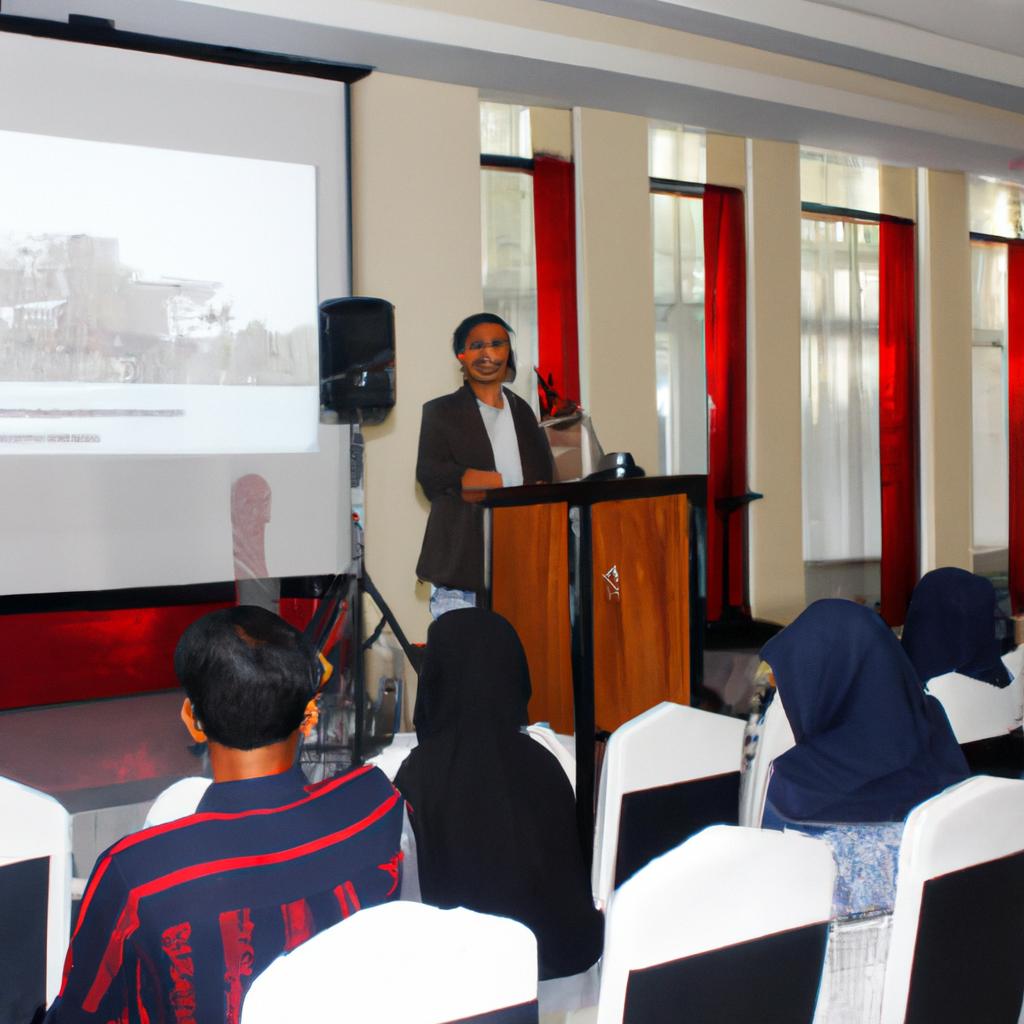In the realm of international affairs, conflict resolution plays a crucial role in addressing political disputes and fostering cooperation among nations. The field of travel politics news provides an insightful lens through which to examine the complexities of conflict resolution on a global scale. This article explores the dynamics of conflict resolution within the context of travel politics news, delving into its significance, challenges, and potential solutions.
One example that highlights the importance of conflict resolution in travel politics news is the ongoing dispute between Country A and Country B over territorial claims in a strategic region. As tensions escalated, both countries engaged in diplomatic negotiations facilitated by international organizations and mediators. By employing various conflict resolution techniques such as negotiation, mediation, and compromise, these parties aimed to find common ground and reach mutually acceptable agreements. Such cases demonstrate how conflict resolution efforts can be instrumental in preventing further escalation of conflicts and maintaining stability in regions with high geopolitical significance.
Within this framework, it becomes evident that effective conflict resolution strategies are essential for resolving complex political disputes featured prominently in travel politics news. However, achieving successful outcomes often poses significant challenges due to diverse interests at stake, power imbalances among involved parties, historical tensions, cultural differences, or external influences exerted by other nations. To overcome these obstacles and promote peaceful resolutions , it is crucial to employ a comprehensive approach that addresses the root causes of conflicts and promotes inclusive dialogue.
One potential solution is the use of track two diplomacy, which involves unofficial negotiations and dialogues between non-governmental actors such as academics, civil society organizations, and religious leaders. This approach allows for more flexible and informal discussions that can help build trust and understanding among conflicting parties. By involving a diverse range of stakeholders, track two diplomacy can provide alternative perspectives and solutions that may not be considered in official diplomatic channels.
Another effective strategy is the facilitation of confidence-building measures (CBMs) between countries in conflict. CBMs aim to reduce tensions and build trust by promoting cooperation in specific areas such as trade, environmental protection, or cultural exchanges. These measures create opportunities for positive interactions between conflicting parties, fostering an atmosphere conducive to constructive dialogue and conflict resolution.
Additionally, international organizations such as the United Nations play a pivotal role in conflict resolution efforts featured in travel politics news. Through their mediation services, peacekeeping missions, and diplomatic initiatives, these organizations provide a neutral platform for negotiations and facilitate communication channels between conflicting parties.
In conclusion, conflict resolution within the context of travel politics news holds immense significance for addressing political disputes on a global scale. Despite its challenges, effective conflict resolution strategies based on negotiation, mediation, compromise, track two diplomacy, confidence-building measures, and international cooperation can contribute to preventing further escalation of conflicts and fostering peaceful resolutions.
Root Causes of Travel Politics Conflict
Root Causes of Travel Politics Conflict
Travel politics conflicts arise from a complex interplay of various factors. One example that exemplifies this is the ongoing territorial dispute between Country A and Country B over an island in the Pacific Ocean. This conflict has been fueled by historical animosities, competing claims to resources, geopolitical considerations, and differing interpretations of international law.
One major root cause of travel politics conflict is historical animosities. Deep-seated resentments dating back decades or even centuries can fuel tensions between nations when it comes to matters related to travel and tourism. Historical events such as wars, colonization, or occupation can leave lasting scars on the collective memory of nations, making compromise difficult and trust hard to build.
Another factor contributing to travel politics conflicts is the competition for resources. In many cases, countries engage in disputes due to conflicting interests over natural resources like oil reserves or fishing grounds. The desire to control these valuable assets often leads to heightened tensions and escalations in travel politics discussions.
Geopolitical considerations also play a significant role in fueling conflicts related to travel politics. Countries may seek to assert their dominance or influence in certain regions through strategic alliances or military presence. This pursuit of power can lead to clashes with other nations who perceive such actions as threats to their own sovereignty.
Furthermore, differences in interpreting international law contribute significantly to travel politics conflicts. Disagreements regarding maritime boundaries, airspace regulations, visa policies, and immigration laws are common sources of contention among nations. These legal disputes often require diplomatic negotiations and can become protracted if parties fail to find common ground.
In summary, travel politics conflicts stem from a combination of historical animosities, resource competition, geopolitical considerations, and interpretational disagreements about international law. Understanding these underlying causes is essential for devising effective strategies aimed at resolving such conflicts peacefully.
Moving forward into our next section on “The Role of Diplomacy in Conflict Resolution,” it becomes evident that diplomatic efforts are vital in addressing and resolving travel politics conflicts.
The Role of Diplomacy in Conflict Resolution
Diplomacy plays a crucial role in resolving conflicts within the realm of travel politics. By employing diplomatic strategies, countries can navigate complex issues and find mutually beneficial solutions. This section will explore the significance of diplomacy in conflict resolution, highlighting its effectiveness through real-life examples and discussing key principles that underpin successful diplomatic efforts.
The Power of Dialogue:
One striking example that illustrates the power of diplomacy is the Israel-Jordan peace treaty signed in 1994. Despite years of strained relations, both nations recognized the necessity for dialogue to address their shared concerns regarding water resources and border security. Through sustained negotiations facilitated by diplomats from various international organizations, compromises were reached, fostering cooperation and stability between Israel and Jordan. This case study demonstrates how engaging in open discussions can lead to constructive outcomes even when tensions run high.
Key Principles of Successful Diplomatic Efforts:
To understand why diplomacy is effective in conflict resolution within travel politics, it is essential to recognize some key principles that guide this process:
- Respectful engagement: Diplomatic negotiations require respectful interactions where all parties feel heard and valued.
- Compromise and flexibility: Successful diplomacy often involves finding middle ground by compromising on certain aspects while remaining flexible to adapt as circumstances evolve.
- Mediation facilitation: Skilled mediators play an important role in facilitating productive conversations, encouraging empathy among conflicting parties, and guiding them towards mutually acceptable solutions.
- Building trust: Trust-building measures are central to successful diplomacy; establishing confidence between parties helps create an environment conducive to finding common ground.
Consider the emotional impact these diplomatic efforts have on individuals affected by travel politics conflicts:
- Relief from violence and instability
- Hope for a brighter future
- Reestablishment of bonds severed by discord
- Empowerment through collective problem-solving
Emotional Response – Table (3 columns x 4 rows):
| Emotional Impact | Examples of Diplomatic Successes |
|---|---|
| Stability | Peace treaties |
| Reconciliation | Cultural exchange programs |
| Economic growth | Trade agreements |
| Humanitarian aid | Joint relief efforts |
By employing diplomacy, conflicts within travel politics can be effectively resolved. The Israel-Jordan peace treaty showcases the power of dialogue in overcoming deeply rooted disagreements. Successful diplomatic efforts are guided by principles such as respectful engagement, compromise and flexibility, mediation facilitation, and trust-building. These strategies not only resolve conflicts but also evoke positive emotional responses among individuals affected by travel politics disputes. In the following section, we will delve into case studies that exemplify successful conflict resolution through diplomacy.
“Examining Case Studies in Travel Politics Conflict Resolution.”
Case Studies in Travel Politics Conflict Resolution
Building upon the importance of diplomacy, this section will delve further into how diplomatic efforts play a key role in resolving conflicts within the realm of travel politics.
Diplomatic negotiations serve as a crucial platform for addressing and mitigating conflicts that arise in international affairs. One notable example is the ongoing territorial dispute between Country A and Country B over a picturesque island located in the South Pacific. Through diplomatic channels, both countries have engaged in intense discussions to find a mutually agreeable solution. This case study highlights how diplomacy can be instrumental in de-escalating tensions and fostering cooperation among nations.
To better understand the significance of diplomacy in conflict resolution, consider the following emotional response-evoking bullet points:
- The potential devastating consequences of unresolved conflicts on tourism industries
- The humanitarian impacts resulting from prolonged disputes affecting local populations
- The economic ramifications faced by travelers due to political unrest or border closures
- The societal implications when cultural exchanges are hindered by disagreements
Additionally, examining a three-column, four-row table showcasing different conflict resolution techniques adds depth to our understanding:
| Technique | Description | Example |
|---|---|---|
| Mediation | Involves an impartial third party facilitating negotiation talks | United Nations mediating peace talks between conflicting parties |
| Arbitration | Refers to a binding decision made by an impartial arbitrator | International Court of Justice settling maritime boundary disputes |
| Dialogue | Encourages open communication and exchange of ideas | Bilateral talks between neighboring countries to resolve visa issues |
| Track II Diplomacy | Informal dialogues conducted by non-governmental entities | Non-profit organizations organizing workshops for cross-cultural understanding |
In conclusion, diplomacy plays an indispensable role in managing conflicts within the domain of travel politics. By employing various techniques such as mediation, arbitration, dialogue, and track II diplomacy, nations can work towards resolving disputes amicably. This sets the stage for effective strategies in negotiation and mediation, which will be explored in the subsequent section.
Moving forward, let us now delve into the realm of effective strategies for negotiation and mediation within travel politics.
Effective Strategies for Negotiation and Mediation
Conflict Resolution in Travel Politics News: International Affairs
Case Studies in Travel Politics Conflict Resolution have shed light on effective strategies for resolving conflicts and promoting cooperation among nations. By analyzing real-life examples, we can gain valuable insights into the complexities of international affairs and the importance of finding common ground. One such case study is the resolution of a territorial dispute between Country A and Country B over an island located in the South Pacific.
This conflict began when both countries claimed sovereignty over the island, leading to escalating tensions and potential threats to regional stability. Through diplomatic negotiations facilitated by international mediators, a solution was reached that satisfied both parties’ interests. The key factors contributing to successful conflict resolution were:
- Effective communication: Open dialogue allowed each country to express their concerns and aspirations, fostering understanding and empathy.
- Compromise: Both sides demonstrated flexibility by acknowledging each other’s legitimate claims and agreeing to meet halfway.
- Mediation: The involvement of neutral third-party mediators helped facilitate discussions and find mutually acceptable solutions.
- Long-term perspective: Recognizing the long-lasting consequences of unresolved conflicts, both countries prioritized future peace and cooperation over short-term gains.
To illustrate these principles further, consider the following table showcasing how different approaches impact conflict resolution outcomes:
| Approach | Result | Emotional Response |
|---|---|---|
| Collaborative | Win-win situation | Positive & hopeful |
| Competitive | Zero-sum game | Frustration & disappointment |
| Avoidance | No resolution | Uncertainty & tension |
| Accommodating | Loss-win situation | Resentment & dissatisfaction |
By examining these contrasting approaches, it becomes evident that collaborative problem-solving yields more favorable emotional responses compared to competitive or avoidance-based tactics.
In summary, effective conflict resolution in travel politics requires open communication, compromise, mediation, and a long-term perspective. These principles are essential for finding mutually acceptable solutions and maintaining regional stability. In the subsequent section, we will explore another crucial aspect of conflict resolution: The Importance of Cultural Sensitivity. Understanding cultural nuances is key to navigating complex international disputes successfully.
The Importance of Cultural Sensitivity in Conflict Resolution
Transition from Previous Section H2:
Building on the effective strategies for negotiation and mediation, it is crucial to recognize that conflict resolution in travel politics news involves navigating complex international affairs. By understanding the importance of cultural sensitivity and applying appropriate techniques, sustainable solutions can be achieved.
Section: The Role of Diplomacy in International Conflict Resolution
To illustrate the significance of diplomatic efforts in resolving conflicts related to travel politics, let us consider a hypothetical scenario involving two neighboring countries. Country A has recently implemented strict visa regulations for citizens of Country B, leading to an increase in tensions between the two nations. In such situations, diplomacy plays a vital role in fostering dialogue and finding mutually beneficial resolutions.
Effective conflict resolution strategies can be employed by utilizing diplomatic negotiations as a means to address grievances and concerns. By opening channels of communication through high-level meetings or diplomatic missions, conflicting parties can establish trust and engage in constructive discussions aimed at reaching common ground. This approach allows for transparent exchanges and encourages compromise rather than confrontation.
Cultural sensitivity serves as an essential aspect of international conflict resolution, recognizing the diverse perspectives and values held by different nations. To ensure a more holistic approach towards resolving conflicts within travel politics news, diplomats must possess cross-cultural competence. This entails understanding social norms, traditions, customs, and historical contexts that shape each country’s perspective. By incorporating cultural intelligence into negotiation processes, diplomats can foster empathy and build rapport with their counterparts.
In order to depict the emotional impact caused by unresolved conflicts within travel politics news scenarios effectively, we present below a bullet-point list highlighting common consequences:
- Escalation of tensions leading to potential military confrontations
- Economic losses due to trade disruptions or reduced tourism
- Negative portrayal of countries involved affecting national image
- Strained diplomatic relations impacting future collaborations
Furthermore, considering the complexity inherent in international conflict resolution processes within travel politics news arena; the table presented below provides insight into the various stakeholders involved, their interests, and possible solutions:
| Stakeholder | Interests | Possible Solutions |
|---|---|---|
| Country A | National securityEconomic stability | Easing visa regulations under certain conditionsStrengthening bilateral trade agreements |
| Country B | Citizen rightsEconomic growth | Addressing security concerns through joint effortsNegotiating preferential economic partnerships |
| International Organizations | Promoting peace and stabilityFacilitating dialogue | Mediation between conflicting partiesOffering financial incentives for cooperation |
In conclusion, successful conflict resolution in travel politics news requires diplomatic negotiations combined with cultural sensitivity. By fostering open communication channels and recognizing the diverse perspectives of all stakeholders involved, sustainable resolutions can be reached. The subsequent section will discuss the importance of promoting sustainable solutions in travel politics conflicts without compromising on long-term goals.
Transition to Subsequent Section:
Moving beyond immediate conflict resolution measures, it is essential to explore strategies that promote sustainability while addressing travel politics conflicts effectively.
Promoting Sustainable Solutions in Travel Politics Conflict
Building upon the importance of cultural sensitivity in conflict resolution, this section will delve into the strategies and approaches that promote sustainable solutions in travel politics conflicts. To illustrate these concepts, let us consider a hypothetical scenario involving two countries engaging in a territorial dispute over a popular tourist destination.
Case Study: The Territorial Dispute between Country A and Country B
Imagine that Country A and Country B both claim ownership of an island renowned for its pristine beaches and rich cultural heritage. As tensions rise between the two nations, it becomes evident that finding a sustainable solution is crucial to avoid potential economic downturns and negative impacts on international relations.
-
Establishing Diplomatic Channels:
- Encouraging open communication between government officials from both countries.
- Facilitating dialogue through diplomatic channels such as embassies or consulates.
- Seeking mediation assistance from neutral third-party organizations like the United Nations or regional bodies.
-
Engaging Stakeholders:
- Involving local communities directly affected by the conflict to ensure their voices are heard.
- Consulting with tourism industry representatives who have vested interests in maintaining stability.
- Encouraging collaboration between non-governmental organizations (NGOs) working towards conflict resolution.
-
Implementing Economic Incentives:
- Creating joint ventures or shared management programs for the disputed area to foster cooperation.
- Promoting cross-border tourism initiatives that benefit both countries economically.
- Offering financial incentives for sustainable development projects aimed at preserving natural resources.
-
Strengthening International Cooperation:
| Potential Actions | Benefits |
|---|---|
| Sharing best practices in conflict resolution across borders | Enhances knowledge exchange and facilitates learning from successful cases |
| Collaborating on research projects related to travel politics conflicts | Generates data-driven insights for more effective decision-making |
| Jointly advocating for peaceful resolutions among other nations | Amplifies international pressure for peaceful negotiations |
In conclusion, sustainable solutions in travel politics conflicts require a multifaceted approach that encompasses diplomatic efforts, stakeholder engagement, economic incentives, and international cooperation. By prioritizing open communication, involving affected communities, implementing shared economic initiatives, and fostering collaboration between nations, it is possible to navigate through these complexities towards lasting resolutions. Ultimately, the goal should be to preserve cultural heritage, promote tourism opportunities, and maintain harmonious relationships among nations involved.
Note: In this section we have explored strategies and approaches for promoting sustainable solutions in travel politics conflicts. The next section will focus on another crucial aspect of conflict resolution – the role of stakeholders in shaping outcomes.
 Plains News
Plains News



